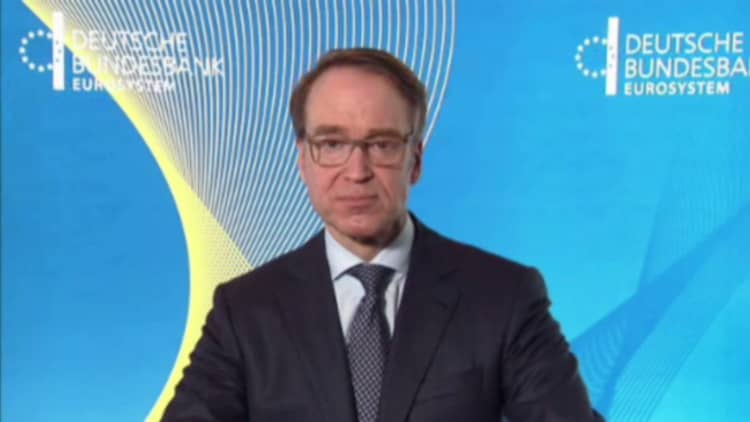
LONDON — The European Central Bank could tweak its coronavirus-related stimulus program, Germany's central bank governor told CNBC Wednesday, with officials wary of recent increases in bond yields.
ECB members have talked about how rising government bond yields in the euro zone, in late February, are "unwelcome and must be resisted" — highlighting concerns that borrowing costs for European governments might rise and risk the economic recovery in the region.
The ECB has tried to contain borrowing costs in the wake of the pandemic, with the implementation of a government bond purchase program, known as PEPP. But the recent moves in the bond market could jeopardize those efforts and lead to more action from the Frankfurt-based institution.
"We have ways to react to this," Jens Weidmann, the governor of the Bundesbank, told CNBC's Annette Weisbach Wednesday, regarding the rise in bond yields.
"The PEPP comes with flexibility and we can use this flexibility to react to such a situation," he added.
Since it was first announced in March 2020, the ECB's Pandemic Emergency Purchase Program has been extended in duration and quantity. It's currently set to last until March 2022, totaling 1.85 trillion euros ($2.23 trillion).
However, data has shown that the ECB's debt purchases have fallen in recent weeks. Although the central bank has explained the drop on larger redemptions, analysts have questioned the reasons behind the decrease in net purchases.
When asked if the ECB could step up purchases again to deal with higher borrowing costs, Weidmann said: "Of course this is one element that is on the table, to use the flexibility we have in implementing the PEPP."
"But again the first step is to analyze the root causes and also to see what effect we have on our ultimate objective which is price stability," he added.
The ECB's next meeting is due on March 11.
Risks from government debt purchases
Weidmann has traditionally been on the hawkish side of monetary policy, advocating for less intervention from the central bank. Speaking at a press conference on Wednesday, Weidmann recalled the risks of large purchases of governments debt.
"Such purchases are, however, also associated with risks, particularly as they can blur the line between monetary and fiscal policy," he said.
"The key issue for me here is that monetary policy must maintain a sufficient distance from monetary financing of government. This includes ensuring that incentives for sound public finances are maintained," he added.
In this context, ECB officials have suggested they might not reach the full amount of government bond purchases. Speaking in December, ECB President Christine Lagarde said "the envelope need not be used in full."
Future stimulus decisions will likely depend on the evolution of the pandemic as well as price dynamics. The ECB's policy mandate is to keep inflation "close but below 2%" over the medium term. January data showed inflation rising to its highest level since the public health emergency hit, to 0.9%.
In addition to the pandemic, the ECB is also looking at climate risks. The central bank is assessing how to be "effective in the fight against climate change" and this could result in a change to some of its policies. However, recent reports have suggested it might disappoint climate change campaigners by only buying bonds of so-called greener assets.
German debt rule
In his home country, politicians are divided over the future of German finances, with some questioning whether the debt brake rule should be reformed. This policy was introduced about a decade ago and limits the German government when taking on new debt.
However, some politicians argue that to boost the economic recovery post-pandemic, Berlin will need more flexibility to spend more.
At the press conference, Weidmann said: "After the pandemic, however, it will be a matter of returning public finances to a sound footing, as Germany will face further fiscal challenges over the longer term."
He cited pensions, health care, climate protection and education as upcoming important expenditures for the German government.
However, Weidmann doesn't think that fiscal consolidation should happen overnight, but rather a process that is spread "appropriately across the economic recovery."
Nonetheless, he called on all European countries, not just Germany, to restore their public finances.
"But all member states of the monetary union, not just Germany, will need to get their budgets in order after the crisis. In the euro area, it is particularly the — in some instances — very high debt ratios that must be brought back down reliably," he said.


